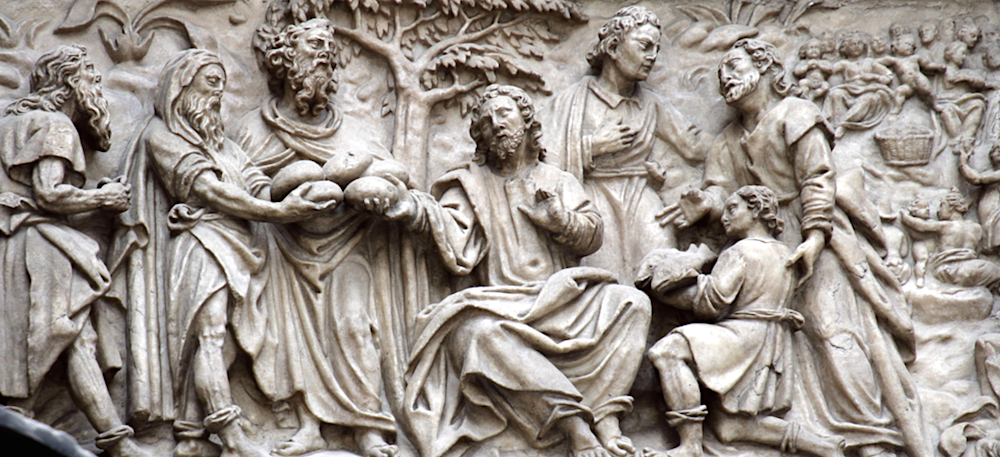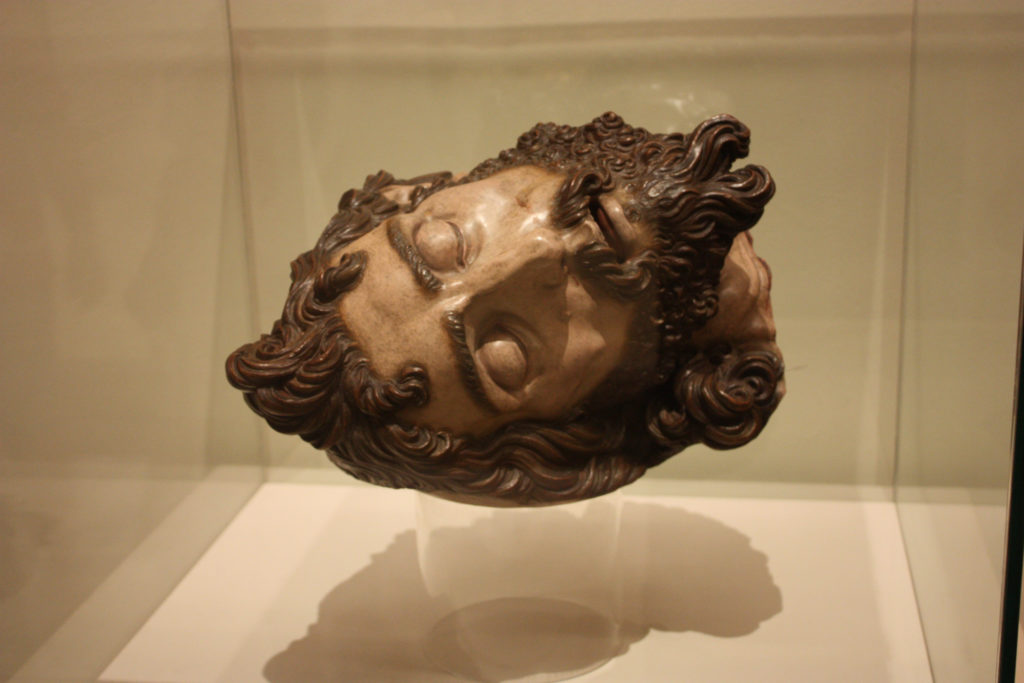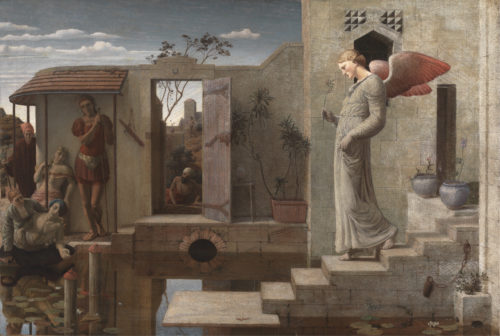
I don’t know about you, but in recent months I’ve been avoiding the news. It’s as if I’m using those skills we develop to screen out the advertising that bombards us in order to screen out the painful news cycles around me, only letting in the ones that seem to be key to my understanding of the world. That’s not necessarily a healthy approach but one that nevertheless helps me survive the current climate of our society. With that in mind, last week’s Gospel reading in the Revised Common Lectionary cycle was especially helpful for me, which may seem odd, given that the reading was the story of the beheading of John the Baptist. Talk about a negative news cycle!
 And it may seem odd to have the story of the beheading of John the Baptist inserted where it is in the Lectionary. If you think about the overall story arc of Mark’s Gospel, Jesus has just sent the disciples out to preach and to do great deeds of power, and after this reading the disciples will return. So why, in the middle of those two events, do we have this story of John the Baptist ending up beheaded so gruesomely? Well, it actually makes sense when one considers Mark’s wider story arc, and it raises an important question for us, especially given today’s social and political climate. The question for us is something like what is the seat of our power? Or, from where is our power to come? We know where Jesus’s power comes from, and that of the disciples, and that of John the Baptist. Knowing the source of power helps determine the ends of that power.
And it may seem odd to have the story of the beheading of John the Baptist inserted where it is in the Lectionary. If you think about the overall story arc of Mark’s Gospel, Jesus has just sent the disciples out to preach and to do great deeds of power, and after this reading the disciples will return. So why, in the middle of those two events, do we have this story of John the Baptist ending up beheaded so gruesomely? Well, it actually makes sense when one considers Mark’s wider story arc, and it raises an important question for us, especially given today’s social and political climate. The question for us is something like what is the seat of our power? Or, from where is our power to come? We know where Jesus’s power comes from, and that of the disciples, and that of John the Baptist. Knowing the source of power helps determine the ends of that power.
Consider for a moment the source of Herod’s power, as it is shown in Mark’s account of his festive birthday banquet. I think it’s fair to say that the seat of Herod’s power is greed, perhaps lust, and definitely a desire to save face. The seat of the stepdaughter’s power seems to be a desire to please, first to please Herod, then to please her mother. And the wife’s power? Jealousy, envy, hatred, fear even. That’s what makes the story unfold the way it does. It’s what determines the ending of the story. Herod’s boasting, his somewhat inappropriate feelings for his stepdaughter, and his need to save face after his unabashed boasting all play their part. Salome’s desire to please her mother, her willingness to make such a vulgar request, even adding that bit about putting the head on a platter.
All of it comes together and comes in conflict with the seat of John the Baptist’s power, which is God. And this is where I see the message for us. Sure, many of us remember those children’s Sunday School images of John the Baptist as a wild man—in his hair shirt and belt, eating locusts and wild honey—a larger-than-life sort of a character. But in the face of the power of Herod Antipas, John’s actual physical power comes off as rather small. He’s a voice, not much more: a voice crying out in the wilderness, the voice of Elijah himself, if we read between the lines, but a voice that unwaveringly speaks truth to the power of Herod, and pays the price for it with his own head, and his own life. And this coming on the heels of the story of Jesus’ rejection at Nazareth, and the sending out of the Twelve in complete vulnerability and dependence on strangers, it should give us pause.
It’s as if Mark is trying to say, “See what this discipleship could get you? See what the end result of it might be?” It’s not by accident or chance that Mark places this story where it is, because in his account of the Gospel what comes next is a very different banquet, a banquet hosted by Jesus himself, one in which Christ will feed 5,000 people with five loaves of bread and two fish. So, considering the story before this story, we have two tales of rejection, one resulting in the death of John, and considering the story after this story, we have a different banquet with a different theme, a different power source, and a very different outcome. And it is in the next chapter that Jesus will finally pop the question that he has been driving towards in Mark’s long story arc. After he feeds the 5,000, heals and preaches some more, then feeds the 4,000, at that point Jesus will get to his point, and will describe the proper power source from which you and I are supposed to function as followers of Christ. Jesus will say to us that anyone who would become his followers, they must deny themselves and take up their crosses and follow him.

That’s to be the source of our power. And many translators assert that this is not actually our crosses, it’s the Cross. The Cross of Christ is to be the source of our power. It is to be the determinant of the arc of our stories, and that again should give us pause, because what kind of a power source is that? The Roman cross should be a symbol of weakness, even defeat, a symbol of complete and total checkmate. Nevertheless, Mark’s message is clear: the weakness of the Cross is the source of our power.
This takes me back to a really old illustration here at Mockingbird, one from Paul Zahl’s seminal talk at the 2009 NYC Conference. It’s on Thornton Wilder’s The Angel that Troubled the Waters. In it Wilder describes the scene around the Pool of Bethesda, where the sick and the lame wait for an Angel to trouble the waters. Once this happens, it is said that the first person to be immersed in the water will be miraculously healed. And so, desperate people in need of healing spend days, weeks, years even, staring intently at this pool of still water, hoping against hope to see the waters stir, to be the first to jump or to roll into it, and to thereby be healed.
In Wilder’s play, from time to time a physician comes to the pool, not to care for others, so much as to seek a healing for himself, from a hidden wound—a wound of the heart, a weakness, something of which he wishes to be set free. And on one occasion, the Angel makes himself visible only to the physician and tells him, “Physician, this healing is not for you. Draw back.”
The physician pleads with the Angel to be healed of his wound, saying, “It is no shame to boast to an Angel what I might yet do in Love’s service were I but freed from this bondage.” One can hear in those words the physician’s pain—his woundedness, and weakness, the most obvious characteristics of the Cross. The Angel crouches down, holds a hand languidly over the water, and says these words to him:
Without your wound, where would your power be? It is your very remorse that makes your low voice tremble into the hearts of men. The very angels themselves cannot persuade the wretched and blundering children on earth as can one human being broken on the wheels of living.
In Love’s service only the wounded soldiers can serve. Draw back.
In Love’s service, only the wounded soldiers can serve. And it is thus through the apparent weakness of the Cross, that our woundedness and weakness become the source of our power, just as the apparent weakness of the Cross is the source of Christ’s power. This is because the end of the story has our weakness and brokenness finding its answer in the love of God shown on the Cross. And the ultimate source of that power is love. God is love, and God so loves us that his own body was broken for us. The risen Christ still bears those wounds in his body, the wounds he endured for us. Without your wound, where would your power be? Christ commanded us to love one another, and he did not leave us in our brokenness, unable to fulfill his commandment.
Instead, it is our very brokenness, our woundedness, our mistakes and our failures, that ultimately find their answer and their power in Christ’s broken body, in Christ’s perfect willingness out of love for us to experience just what it means to be broken on the wheels of human life. Having loved us as his own, he loved us to the very end. This, then, is the source of a very real power. It’s the source of God’s power, rooted in the power of his supreme love for us.

COMMENTS
3 responses to “The One Power Source That Never Fails (“Without Your Wound, Where Would Your Power Be?”)”
Leave a Reply














There seems to be a word missing in this sentence from the second to the last paragraph. Can anyone fill it in to ease my confusion or is that my wound? “Christ commanded us to love one another, and he did not _______ us in our brokenness, unable to fulfill his commandment.”
Thanks, Timothy, I just fixed it. He did not leave us in our brokenness, unable to fulfill his commandment.
Such potent words, healing and life-giving. Amen and thank you!